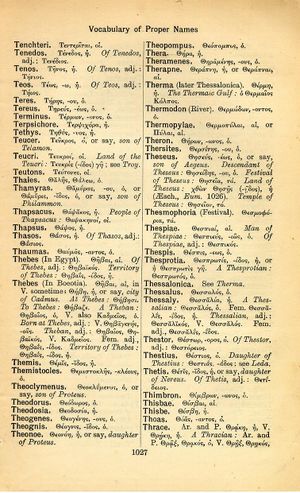Thamyras
ὡς μήτε τὰ γενόμενα ἐξ ἀνθρώπων τῷ χρόνῳ ἐξίτηλα γένηται → in order that so the memory of the past may not be blotted out from among men by time
English > Greek (Woodhouse)
Θαμύρας, -ου, ὁ, or Θάμυρις, -ιδος, ὁ, or say, son of Philammon.
Latin > English (Lewis & Short)
Thămyras: ae, m.,
I a Thracian poet who entered into a contest with the Muses, and, being vanquished, was deprived of his eyes, Prop. 2, 22 (3, 15), 19; Ov. Am. 3, 7, 62; id. A. A. 3, 399; id. Ib. 274; Plin. 7, 56, 57, § 204.—Called Thămyris, ĭdis, Stat. Th. 4, 183.
Latin > French (Gaffiot 2016)
Thămўrās, æ, m., (Thămўris, is, m., Stat. Th. 4, 183 ), poète de Trace qui, ayant fait assaut de chants avec les Muses, fut battu, puis privé de la voix et de la vue : Prop. 2, 22, 19 ; Ov. Am. 3, 7, 62 ; Plin. 7, 204.
Latin > German (Georges)
Thamyrās, ae, m. u. Thamyris, idis, m. (Θάμυρις), ein thrazischer Dichter, der mit den Musen einen Wettstreit einging und besiegt seiner Laute und Augen beraubt wurde, Form -ās, Prop. 2, 22, 19. Ov. am. 3, 7, 62 (Akk. -ān); art. am. 3, 399 (Akk. -am): griech. Form -is, Stat. Theb. 4, 183.

